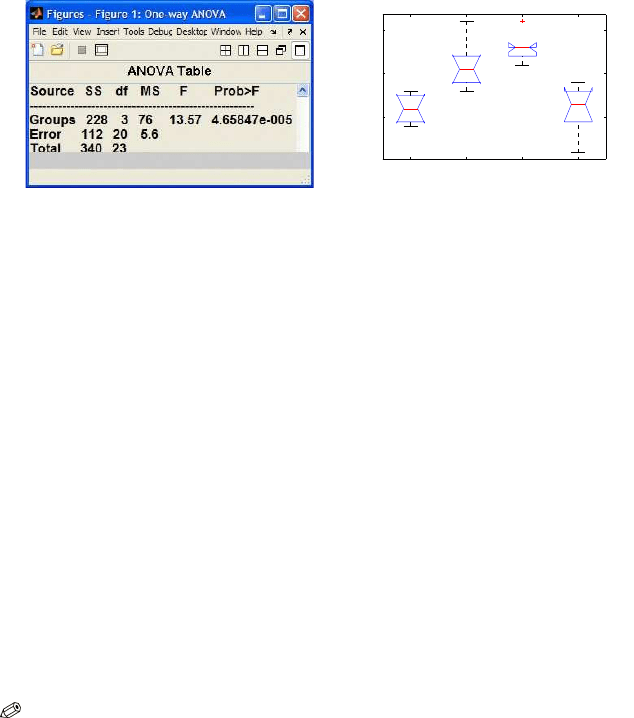Vidakovic B. Statistics for Bioengineering Sciences: With Matlab and WinBugs Support
Подождите немного. Документ загружается.


Chapter 11
ANOVA and Elements of Experimental
Design
Design is art optimized to meet objectives.
– Shimon Shmueli
WHAT IS COVERED IN THIS CHAPTER
• ANOVA Model Formulation
• Contrasts and Multiple Comparisons
• Factorial Designs
• Randomized Block Designs and Repeated Measures Designs
• Nested Designs
• Sample Sizes in ANOVA
• Functional ANOVA
• Analysis of Means (ANOM)
• Gauge R&R ANOVA
• Testing Equality of Proportions and Poisson Means
11.1 Introduction
In Chap. 10 we discussed the test of equality of means from two populations,
H
0
: µ
1
= µ
2
. Under standard assumptions (normality and independence) the
proper test statistic had t-distribution, and several tests (equal/different vari-
© Springer Science+Business Media, LLC 2011
B. Vidakovic, Statistics for Bioengineering Sciences: With MATLAB and WinBUGS Support, 409
Springer Texts in Statistics, DOI 10.1007/978-1-4614-0394-4_11,
410 11 ANOVA and Elements of Experimental Design
ances, paired/unpaired samples) shared the common name “two-sample t-
tests.”
Many experimental protocols involve more than two populations. For ex-
ample, an experimenter may be interested in comparing the sizes of cells
grown under several experimental conditions. At first glance it seems that
we can apply the t-test on all possible pairs of means. This “solution” would
not be satisfactory since the probability of type I error for such a procedure
is unduly large. For example, if the equality of four means is tested by test-
ing the equality of
¡
4
2
¢
=
6 different pairs, each at the level of 5%, then the
probability of finding a significant difference when in fact all means are equal
is about 26.5%. We already discussed in Sect. 9.7 the problems of controlling
type I error in multiple tests.
An appropriate procedure for testing hypotheses of equality of several
means is the analysis of variance (ANOVA). ANOVA is probably one of the
most frequently used statistical procedures, and the reasoning behind it is
applicable to several other, seemingly different, problems.
11.2 One-Way ANOVA
ANOVA is an acronym for Analysis of Variance. Even though we are testing for
differences among population means, the variability among the group means
and the variability of the data within the treatment group are compared. This
technique of separating the total variability in data to between and within
variabilities is due to Fisher (1918, 1921).
Suppose we are interested in testing the equality of k means
µ
1
,... , µ
k
char-
acterizing k independent populations
P
1
,... , P
k
. From the ith population P
i
a sample
y
i1
, y
i2
,... , y
in
i
of size n
i
is taken. Let N =
P
k
i
=1
n
i
be the total sample size. The responses y
i j
are modeled as
y
i j
=µ
i
+²
i j
, 1 ≤ j ≤n
i
; 1 ≤ i ≤ k, (11.1)
where
²
i j
represents the “error” and quantifies the stochastic variability of
difference between observation y
i j
and the mean of the corresponding popu-
lation,
µ
i
. Sometimes the µ
i
s are called treatment means, with index i repre-
senting one of the treatments.
We are interested in testing whether all population means
µ
i
are equal,
and the procedure is called one-way ANOVA. The assumptions underlying one-
way ANOVA are as follows:
(i) All populations are normally distributed;

11.2 One-Way ANOVA 411
(ii) The variances in all populations are the same and constant (assumption
of homoscedasticity);
(iii) The samples are mutually independent.
That can be expressed by the requirement that all y
i j
in (11.1) must be
i.i.d. normal
N (µ
i
,σ
2
) or, equivalently, all ²
i j
s must be i.i.d. normal N (0,σ
2
).
Normal population
1 2 . . . k
Population mean µ
1
µ
2
. . . µ
k
Common variance σ
2
σ
2
. . . σ
2
If the sample sizes are the same, i.e., n
1
= n
2
= ··· = n
k
= N/k, then the
ANOVA is called balanced. It is often the case that many experiments are
designed as a balanced ANOVA. During an experiment it may happen that a
particular measurement is missing due to a variety of reasons, resulting in an
unbalanced layout. Balanced designs are preferable since they lead to simpler
computations and interpretations.
In terms of model (11.1), the null hypothesis to be tested is
H
0
: µ
1
=µ
2
=···=µ
k
,
and the alternative is
H
1
: (H
0
)
c
(or µ
i
6=µ
j
, for at least one pair i, j.
Note that the alternative H
1
≡(H
0
)
c
is any negation of H
0
. Thus, for exam-
ple,
µ
1
>µ
2
=µ
3
=···= µ
k
or µ
1
=µ
2
6=µ
3
=µ
4
=···= µ
k
are valid alternatives.
Later we will discuss how to assess the alternative if H
0
is rejected.
One can reparameterize the population mean
µ
i
as µ
i
= µ +α
i
. Simply
speaking, the treatment mean is equal to the mean common for all treatments
(called grand mean
µ) plus the effect of the population group (treatment effect)
α
i
. The hypotheses now can be restated in terms of treatment effects:
H
0
: α
1
=α
2
=···=α
k
=0.
The alternative is H
1
: Not all α
i
s are equal to 0.
The representation
µ
i
= µ + α
i
is not unique. We usually assume that
P
i
α
i
= 0. This is an identifiability assumption needed to ensure the unique-
ness of the decomposition
µ
i
= µ +α
i
. Indeed, by adding and subtracting any
number c,
µ
i
becomes µ +α
i
= (µ + c) +(α
i
− c) = µ
0
+α
0
, and uniqueness is
assured by
P
i
α
i
= 0. This kind of constraint is sometimes called sum-to-zero
(STZ) constraint. There are other ways to ensure uniqueness; a sufficient as-
sumption is, for example,
α
1
=0. In this case µ = µ
1
becomes the reference or
baseline mean. Before providing the procedure for testing H
0
, which is sum-
marized in the ANOVA table below, we review the notation.

412 11 ANOVA and Elements of Experimental Design
y
i j
jth observation from treatment i
y
i
Sample mean from the treatment i
y Average of all observations
µ
i
Population treatment mean
µ Population grand mean
α
i
ith treatment effect
n
i
Size of ith sample
k Number of treatments
N Total sample size
11.2.1 ANOVA Table and Rationale for F-Test
The ANOVA table displays the data summaries needed for inference about the
ANOVA hypothesis. It also provides an estimator of the variance in measure-
ments and assesses the goodness of fit of an ANOVA model.
The variability in data follows the so-called fundamental ANOVA identity
in which the total sum of squares (SST) is represented as a sum of the treat-
ment sum of squares (SSTr) and the sum of squares due to error (SSE):
SST
= SST r +SSE = SS
Between
+SS
Within
,
k
X
i=1
n
i
X
j=1
(y
i j
− y)
2
=
k
X
i=1
n
i
(y
i
− y)
2
+
k
X
i=1
n
i
X
j=1
(y
i j
− y
i
)
2
.
The standard output from most statistical software includes degrees of
freedom (DF), mean sum of squares, F ratio, and the corresponding p-value:
Source DF Sum of squares Mean squares F p
Treatment k −1 SST r MST r = SSTr/(k −1) MSTr/MSE P(F
k−1,N−k
>F)
Error N
−k SSE MSE =SSE/(N −k)
Total N −1 SST
The null hypothesis is rejected if the F-statistic is large compared to the
(1
−α) quantile of an F distribution with k −1 and N −k degrees of freedom. A
decision can also be made by looking at the p-value.
Rationale. The mean square error, MSE, is an unbiased estimator of
σ
2
.
Indeed,

11.2 One-Way ANOVA 413
MSE =
1
N −k
k
X
i=1
n
i
X
j=1
(y
i j
− y
i
)
2
=
1
N −k
k
X
i=1
"
(n
i
−1)
1
n
i
−1
n
i
X
j=1
(y
i j
− y
i
)
2
#
=
1
N −k
k
X
i=1
(n
i
−1)s
2
i
, and
E(MSE) =
1
N −k
k
X
i=1
(n
i
−1)E(s
2
i
) =
1
N −k
k
X
i=1
(n
i
−1)σ
2
=σ
2
.
On the other hand, mean square error due to treatments,
MST r
=
SSTr
k −1
=
1
k −1
k
X
i=1
n
i
(y
i
− y)
2
,
is an unbiased estimator of
σ
2
only when H
0
is true, that is, when all µ
i
are
the same. This follows from the fact that
E(MST r) =σ
2
+
P
i
n
i
(α
i
)
2
k −1
,
where
α
i
= µ
i
−µ is the population effect of treatment i. Since under H
0
α
1
= α
2
= ··· = α
k
= 0, the E(MSE) is equal to σ
2
, and MSTr is an unbiased
estimator of variance. When H
0
is violated, not all α
i
are 0, or, equivalently,
P
α
2
i
> 0. Thus, the ratio MST r/MSE quantifies the departure from H
0
, and
large values of this ratio are critical.
Example 11.1. Coagulation Times. To illustrate the one-way ANOVA we
work out an example involving coagulation times that is also considered by
Box et al. (2005). Twenty-four animals are randomly allocated to 4 different
diets, but the numbers of animals allocated to different diets are not the same.
The blood coagulation time is measured for each animal. Does diet type sig-
nificantly influence the coagulation time? The data and MATLAB solution are
provided next.
times = [62, 60, 63, 59, 63, 67, 71, 64, 65, 66, 68, 66, ...
71, 67, 68, 68, 56, 62, 60, 61, 63, 64, 63, 59];
diets = {’dietA’,’dietA’,’dietA’,’dietA’,’dietB’,’dietB’,...
’dietB’,’dietB’,’dietB’,’dietB’,’dietC’,’dietC’,’dietC’,...
’dietC’,’dietC’,’dietC’,’dietD’,’dietD’,’dietD’,’dietD’,...
’dietD’,’dietD’,’dietD’,’dietD’};
[p,table,stats] = anova1(times, diets,’on’)
% p = 4.6585e-005
% table =
%’Source’ ’SS’ ’df’ ’MS’ ’F’ ’Prob>F’
%’Groups’ [228] [ 3] [ 76] [13.5714] [4.6585e-005]
%’Error’ [112] [20] [5.6000] [] []

414 11 ANOVA and Elements of Experimental Design
%’Total’ [340] [23] [] [] []
%
%stats =
% gnames: 4x1 cell
% n: [4 6 6 8]
% source: ’anova1’
% means: [61 66 68 61]
% df: 20
% s: 2.3664
dietA dietB dietC dietD
60
65
70
(a) (b)
Fig. 11.1 (a) ANOVA table and (b) boxplots, as outputs of the
anova1 procedure on the
coagulation times data.
From the ANOVA table we conclude that the null hypothesis is not tenable,
the diets significantly affect the coagulation time. The p-value is smaller than
0.5
·10
−4
which indicates strong support for H
1
.
The ANOVA table featured in the output and Fig. 11.1a is a standard way
of reporting the results of an ANOVA procedure. The SS column in the ANOVA
table restates the fundamental ANOVA identity SST r
+SSE =SST as 228 +
112 = 340. The degrees of freedom for treatments, k −1, and the error, n −
k, are additive and their sum is total number of degrees of freedom, n −1.
Here, 3
+20 = 23. The column with mean square errors is obtained when the
sums of squares are divided by their corresponding degrees of freedom. The
ratio F
= MST r/MSE is the test statistic distributed as F with (3, 20) degrees
of freedom. The observed F
= 13.5714 exceeds the critical value finv(0.95,
3, 20)=3.0984
, and H
0
is rejected. Recall that the rejection region is always
right-tailed, in this case [3.0984,
∞). The p-value is 1-fcdf(13.5714, 3, 20)=
4.6585e-005
. Figure 11.1b shows boxplots of the coagulation times by the diet
type.
Since the entries in ANOVA table are interrelated, it is possible to recover
a table from only a few entries (e.g., Exercises 11.4, 11.7, and 11.14).

11.2 One-Way ANOVA 415
11.2.2 Testing Assumption of Equal Population Variances
There are several procedures that test for the fulfillment of ANOVA’s condition
of homoscedasticity, that is, the condition that the variances are the same and
constant over all treatments.
A reasonably sensitive and simple procedure is Cochran’s test.
11.2.2.1 Cochran’s Test.
Cochran’s test rejects the hypothesis that k populations have the same vari-
ance if the statistic
C
=
s
2
max
s
2
1
+···+s
2
k
is large. Here, s
2
1
,... , s
2
k
are sample variances in k samples, and s
max
is the
largest of s
2
1
,... , s
2
k
. Cochran’s test is implemented by Cochtest.m (Trujillo-
Ortiz and Hernandez-Walls, MATLAB Central, File ID: #6431).
11.2.2.2 Levene’s Test.
Levene’s test (Levene, 1960) hinges on the statistic
L
=
(N −k)
P
k
i
=1
n
i
(Z
i·
−Z
··
)
2
(k −1)
P
k
i
=1
P
n
i
j=1
(Z
i j
−Z
i·
)
2
,
where Z
i j
= |y
i j
− y
i·
|. To enhance the robustness of the procedure, the sam-
ple means could be replaced by the group medians, or trimmed means. The
hypothesis H
0
: σ
1
=σ
2
=···=σ
k
is rejected at level α if L >F
k−1,N−k,α
.
11.2.2.3 Bartlett’s Test.
Another popular test for homoscedasticity is Bartlett’s test. The statistic
B
=
(N −k)log s
2
p
−
P
k
i
=1
(n
i
−1) log s
2
i
1 +
1
3(k−1)
×(
P
k
i
=1
1
n
i
−1
−
1
N−k
)
,
where s
2
p
is the pooled sample variance
(n
1
−1)s
2
1
+···+(n
k
−1)s
2
k
N−k
, has an approx-
imately
χ
2
k
−1
distribution. Large values of B are critical, i.e., reject H
0
if
B
>χ
2
k
−1,α
, where α is the significance level.

416 11 ANOVA and Elements of Experimental Design
In MATLAB, Bartlett’s test is performed by the vartestn(X) command
for samples formatted as columns of
X, or as vartestn(X, group) for vec-
tor
X, where group membership of X s is determined by the vector group.
Bartlett’s test is the default. Levene’s test is invoked by optional argument,
vartestn(...,’robust’). In the context of Example 11.1, Bartlett’s and Lev-
ene’s tests are performed in MATLAB as
% Coagulation Times: Testing Equality of Variances
[pval stats]=vartestn(times’, diets’,’on’) %Bartlet
% pval = 0.6441
% chisqstat: 1.6680
% df: 3
[pval stats]=vartestn(times’, diets’,’on’,’robust’) %Levene
% pval = 0.6237
% fstat: 0.5980
% df: [3 20]
According to these tests the hypothesis of equal treatment variances is not
rejected. Cochran’s test agrees with Bartlett’s and Levene’s, giving a p-value
of 0.6557.
Remark. As mentioned in the case of comparing the two means (p. 358), the
variances-before-means type procedures are controversial. A celebrated statis-
tician George E. P. Box criticized checking assumptions of equal variances be-
fore testing the equality means, arguing that comparisons of means are quite
robust procedures compared to a non-robust variance comparison (Box, 1953).
Aiming at Bartlett’s test in particular, Box summarized his criticism as fol-
lows: “To make the preliminary test on variances is rather putting to sea in a
rowing boat to find out whether conditions are sufficiently calm for an ocean
liner to leave port!”
11.2.3 The Null Hypothesis Is Rejected. What Next?
When H
0
is rejected, the form for the alternative is not obvious as in the case
of two means, and thus one must further explore relationships between the
individual means. We will discuss two posttest ANOVA analyses: (i) tests for
contrasts and (ii) pairwise comparisons. They both make sense only if the null
hypothesis is rejected; if H
0
is not rejected, then both tests for contrasts and
pairwise comparisons are trivial.
11.2.3.1 Contrasts
A contrast is any linear combination of the population means,

11.2 One-Way ANOVA 417
C = c
1
µ
1
+c
2
µ
2
+···+c
k
µ
k
,
such that
P
k
i
=1
c
i
=0.
For example, if
µ
1
,... , µ
5
are means of k = 5 populations, the linear com-
binations (i) 2
µ
1
−µ
2
−µ
4
, (ii) µ
3
−µ
2
, (iii) µ
1
+µ
2
+µ
3
−µ
4
−2µ
5
, etc. are all
contrasts since 2
−1 +0 −1 +0 =0, 0 −1 +1 +0 +0 =0, and 1 +1 +1 −1 −2 =0.
In the ANOVA model, y
i j
= µ
i
+²
i j
, i = 1,..., k; j = 1, ..., n
i
, sample treat-
ment means
y
i
=
1
n
i
P
n
i
j=1
y
i j
are the estimators of the population treatment
means
µ
i
. Let N = n
1
+···+ n
k
be the total sample size and s
2
= MSE the
estimator of variance.
The test for a contrast
H
0
:
k
X
i=1
c
i
µ
i
=0 versus H
1
:
k
X
i=1
c
i
µ
i
<,6=,>0 (11.2)
is based on the test statistic that involves sample contrast c
i
y
i
t =
P
k
i
=1
c
i
y
i
s
r
P
k
i
=1
c
2
i
n
i
that has a t-distribution with N − k degrees of freedom. Here,
ˆ
C =
P
k
i
=1
c
i
y
i
is an estimator of contrast C and s
2
P
k
i
=1
c
2
i
n
i
is the sample vari-
ance of
ˆ
C.
The (1
−α)100% confidence interval for the contrast is
k
X
i=1
c
i
y
i
−t
N−k,1−α/2
·s ·
v
u
u
t
k
X
i=1
c
2
i
n
i
,
k
X
i=1
c
i
y
i
+t
N−k,1−α/2
·s ·
v
u
u
t
k
X
i=1
c
2
i
n
i
.
Sometimes, contrast tests are called single-degree F-tests because of the
link between t- and F-distributions. Recall that if random variable X has a
t-distribution with n degrees of freedom, then X
2
has an F-distribution with
1 and n degrees of freedom. Thus, the test of contrast in (11.2) against the
two-sided alternative can equivalently be based on the statistic

418 11 ANOVA and Elements of Experimental Design
F =
¡
P
k
i
=1
c
i
y
i
¢
2
s
2
P
k
i
=1
c
2
i
n
i
,
which has an F-distribution with 1 and N
−k degrees of freedom. This F-test
is good only for two-sided alternatives since the direction of deviation from H
0
is lost by squaring the t-statistic.
Example 11.2. As an illustration, let us test the hypothesis H
0
: µ
1
+µ
2
=µ
3
+
µ
4
in the context of Example 11.1. The above hypothesis is a contrast since
it can be written as
P
i
c
i
µ
i
= 0 with c =(1,1,−1,−1). The following MATLAB
code tests the contrast against the one-sided alternative and also finds the
95% confidence interval for
P
i
c
i
µ
i
.
m = stats.means %[p,table,stats] = anova1(times, diets)
%from Example Coagulation Times
c = [ 1 1 -1 -1 ];
L = c(1)
*
m(1) + c(2)
*
m(2)+c(3)
*
m(3) + c(4)
*
m(4) %L=-2
LL= m
*
c’ %LL=-2
stdL = stats.s
*
sqrt(c(1)^2/4+c(2)^2/6+c(3)^2/6+c(4)^2/8)
%stdL = 1.9916
t = LL/stdL %t =-1.0042
%test H
_
o: mu
*
c’ = 0 H
_
1: mu
*
c’ < 0
% p-value
tcdf(t, 23) %0.1629
%or 95% confidence interval for population contrast
[LL - tinv(0.975, 23)
*
stdL, LL + tinv(0.975, 23)
*
stdL]
% -6.1200 2.1200
The hypothesis H
0
: µ
1
+µ
2
= µ
3
+µ
4
is not rejected, and the p-value is
0.1629. Also, the confidence interval for
µ
1
+µ
2
−µ
3
−µ
4
is [−6.12,2.12].
Orthogonal Contrasts*. Two or more contrasts are called orthogonal if
their sample counterpart contrasts are uncorrelated. Operationally, two con-
trasts c
1
µ
1
+c
2
µ
2
+···+ c
k
µ
k
and d
1
µ
1
+d
2
µ
2
+···+d
k
µ
k
are orthogonal if in
addition to
P
i
c
i
=
P
i
d
i
=0, the condition c
1
d
1
+c
2
d
2
+···+c
k
d
k
=
P
i
c
i
d
i
=0
holds. For unbalanced designs the condition is
P
i
c
i
d
i
/n
i
=0.
If there are k treatments, only k
−1 mutually orthogonal contrasts can be
constructed. Any additional contrast can be expressed as a linear combination
of the original k
−1 contrasts. For example, if
Treatments
Contrast 1 2 3 4
C
1
1 –1 –1 1
C
2
1 0 0 –1
C
3
0 1 –1 0
